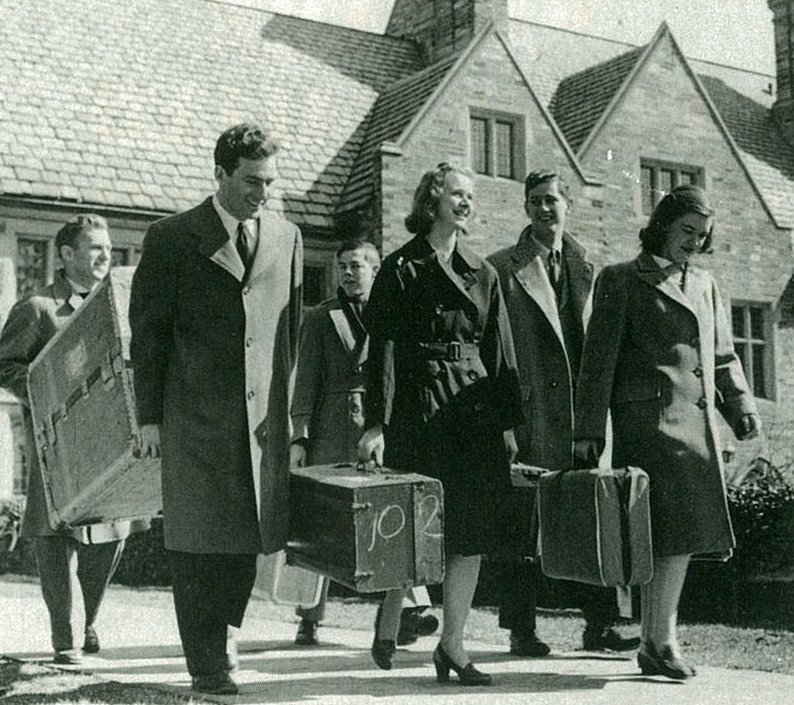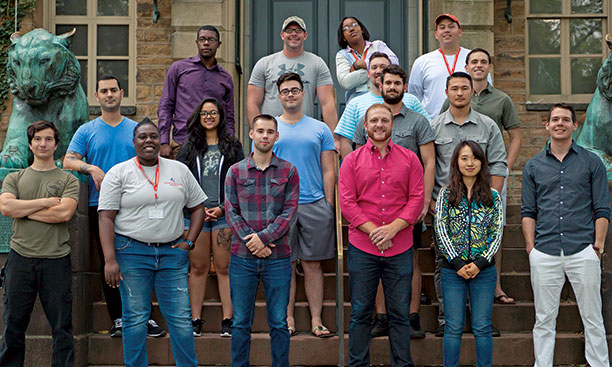“I must study politics and war that my sons may have liberty to study mathematics and philosophy.”
— John Adams
William A. Chisolm M5 was reelected President of Terrace Club after first being chosen for that office in March. Chisolm is a native of New York City and attended Millbrook School. He is an Army veteran and was until recently a managing editor of the Daily Princetonian. He is also Chairman of the Freshman Committee of Orange Key and Commodore of the University Yacht Club. The new vice-president is Edward R. Vogel ’47 who is a veteran of the Army Air Forces and came to Princeton from Brooks School. As treasurer the members of Terrace elected Donald R. Stauffer ’46 of Boyertown, Pa. who spent two and one-half years in the Army where he attended Japanese Language School. Henry J. Mitchell ’48 of the Naval Training Unit was elected secretary. Tower Club elected Robert B. Payne M5 of Tyler, Texas as president. Payne served in the Field Artillery as a liaison pilot and is at present a member of the Flying Club. David H. Betts ’45 was chosen vice-president of the club and is a native of Evanston, Ill. Betts writes music and plays the piano for the Triangle Club and the Theatre Intime Shows. He served 16 months overseas with the 103rd Infantry Division. The newly elected treasurer is John S. Mount ’46 whose home is in Princeton. He is a letter man in track and cross-country. He served with the American Field Service overseas. W. M. Thompson Jr. ’47 of Pittsburgh, Pa. was elected Secretary of Tower. Thompson is a graduate of Avonworth High School and entered Princeton this term as a transfer student from Franklin and Marshall College. He is a veteran of the U. S. Marine Corps.
The number of rich potential cultural issues to discuss from that one innocuous article is striking. But the interplay of preppies, military men, various services, transfer students, college careers interrupted by war, college careers deferred by war, special wartime curricula, and even, tacitly, a number of wives and families waiting for the “temporary” Butler tract housing provided a range of experience within the undergraduate student body that is unimaginable today (or to be fair, before or since). The freshman Class of 1950 that fall was typified by our friends the brothers Billington: David ’50, the elder, had already served in the Navy, Jim ’50, the younger, came straight from high school and became class valedictorian; both became wildly popular Princeton professors. Meanwhile, the University enrolled almost 3,300 undergraduate students, 50 percent more than at any time before the war — more, in fact, than it did 20 years later. The graduate-student body doubled too, including one young decorated Army veteran from the Class of 1940 who renewed his studies in classics and received his Ph.D. in 1948; his name was Bob Goheen. At one brief point, two-thirds of the students on campus were World War II veterans.
You might assume that dinners around the table in Commons and at the clubs involved many deep discussions of wartime adventures and derring-do, of great campaigns in France and Iwo Jima, of world affairs as the Soviet Union began to unfurl its intentions in Eastern Europe, much like the stereotypical movie versions of the officers’ club bar back at the French aerodrome following a day in the bright blue yonder matching wits and machine guns with the Red Baron. Not to dampen a good plotline, but I’m here to tell you that has nothing to do with reality. My friends from the ’40s classes and the Prince coverage demonstrate that they talked about … football, bicker, the new Firestone Library, crabby professors, housing shortages, midterms, and theses. Just like you. Because, to oversimplify only slightly, they were at Princeton because that’s what they wanted to be — just like you. A large number had been through trying, even ghastly challenges that made them different people than they had previously been, but the now-changed veterans were hell-bent on being normal. If they had fallen comrades — the ’46 classmates above had 16 fellows killed in the war — they were likely remembered more by internalized resolve to make the most of Princeton rather than by overtly dwelling on the past.
My father was an Army graves-administration officer in Europe in World War II; because he was medically delayed from going over, he missed the Battle of the Bulge in which a number of his friends died. I only know most of that because my mom told me. In Vietnam, I had a relatively cushy job at Army headquarters in Saigon, but the context and implications were so hideous I’ve essentially never discussed them in detail with anyone — including my father, who I suspect avoided it in deference to his own reticence. During two subsequent separate grad degrees with GI Bill help, I don’t recall talking about the war more than twice, including with fellow vets. When you see veterans in Ken Burns’ World War II and Vietnam documentaries (if you respect your American citizenship, you should watch every minute of both — about 32 hours) discussing their experiences, you must realize that they are responding to master interviewers, and are suffering terribly despite the knowledge they are doing something important. Look at their faces.
So what, then, do we expect veterans to add to the campus of Princeton as undergraduates? While it has been beneficial to have many accomplished career officers studying at the Graduate School, from Brig. Gen. Pete Dawkins *79 to Adm. William Crowe Jr. *65 to Gen. David Petraeus *87, it’s not the same thing. I know we often pay lip service to leadership qualities, and would expect them of veterans who can get into Princeton, but I can tell you from Alumni Schools Committee experience that a huge range of current undergrads have exhibited all sorts of leadership in their hometowns; many of them are revered by most of the adults they know. So if the vets aren’t going to be forthcoming with their experiences in the wider world, why do we need them?
There are, as I see it, two answers to that. The first is that experience at Kandahar or aboard the USS Princeton is so inherently different that it can have an effect on interpersonal relations without being mentioned, and so truly diversify everyone’s education. If you watch the Burns films, you will believe that. The second is that it’s fair. In a portion of our nation we have pushed further and further away from our daily concerns — while maintaining multiple hot wars — they have toiled in the vineyard, and if they can do the work here, they more than deserve a nice bottle of wine in Princeton on their own terms.
As you’ve read, it has been a struggle to adapt the University’s well-oiled admission process to the issue of recruiting vets, although money is clearly no object. A multipronged effort this year after long preparation has resulted in a total of five in the entering Class of 2021, which is large in relation to anything in recent memory. Next year, the University begins taking a handful of transfer students for the first time in decades, giving veterans with prior credits and community-college megastars a fighting chance. I hope it’s effective, although I can readily imagine hundreds of other types of students who will be attracted, just as the many thousands of stellar high school grads we turn away today. It won’t be simple, it won’t save the world even if it’s a modest success, and it won’t magically turn our Facebook-addled overachievers into young Bishop Tutus. But it is the right thing to do.So for Veterans’ Day, thank your vet friends for their service, sure, but also send a nice note to Janet Rapelye and Chris Eisgruber ’83 to tell them you appreciate their recognition of the great people from the veteran community they’re bringing to Princeton, and urge them to keep up the good work.
Dei sub numine viget.













1 Response
George L. Bustin ’70
8 Years AgoExcellent and timely piece...
Excellent and timely piece. The Admissions Office project to increase the number of veterans in the undergraduate body is well under way; experienced recruiters from that office have been at Camp Pendleton and other installations and are working with veterans' organizations to make Princeton accessible to many who would not otherwise think about it.